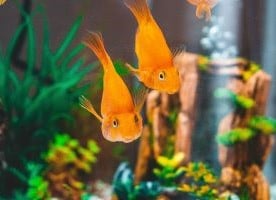Basic Things Every Aquarium Should Have

You’ve seen a couple of beautiful aquariums and it sparked an interest in you. You are thinking; “how hard can it be to set this up at my place?” A beautiful shiny goldfish, water, some grass, lightning, and a tank. Easy peasy, right?
Well, you are right to some extent. Fishes are often thought of as simple and no-stress animals. No shouting, no peeing, and definitely no droppings, just regular feeding. Even though they don’t always require much attention and care, setting up their abode (an aquarium) does need you to put in some work.
When an aquarium isn’t properly set up, it can cause serious damage to the fish. Therefore, it’s important you learn the basics of setting up an aquarium before you purchase or get started. It’s quite easy to walk into a pet shop to ask for a fish and its tank, however, what you might not find so easy is what else should be in the aquarium. Below you’ll find a list of what you’d need when setting up the aquarium.
1. Aquarium and Stand
The aquarium is certainly the first thing to get if you want a pet fish. You want to get one that is large and spacious. Also, considering the space you have available. It wouldn’t be wise to buy a 55-gallon tank when you’re living in a dorm room. What would make sense for anyone is getting a tank with a 20-gallon capacity that can easily fit anywhere.
Go for short and long tanks rather than tall thin ones; the former allows for more swimming space and air exchange. There are also glass and acrylic aquariums to choose from with acrylic tanks being preferred by parents with kids because of their unbreakable feature.
Now also bear in mind that aquariums are quite heavy coupled with water to be added to it. You’d need a good stand for it to be effective and no, your book stand or bookcase isn’t a good option for your aquarium. Ensure you get a stand that can withstand the weight of your aquarium.
2. Decoration
These aren’t must-haves for your aquarium, they vary based on your preference. Anything relating to the ocean that you love would be nice. There’s actually no limit to how much you can decorate your tank.
Pay a visit to your local store for decorations you love. You could also go online for unique aquarium decorations you might not find in the local fish store. Just ensure anything you put in the aquarium is safe for the fish.
3. Lid, Light, or Hood
The average tank is either sold with a lid that’s separate from the light or the lid joined with the which is referred to as the hood. What purpose does the lid serve? It covers the tank and prevents the fish from leaping out of the aquarium. Also, it minimizes the effect of evaporation and if the light isn’t separate from the lid, it keeps it from getting wet. You might want to go for glass lids as they’re easy to clean, provide tight covering, and allow light into the aquarium.
Just in case the light is attached to the lid, you’d need to purchase it separately. If you’re just starting out, the fluorescent and LED light is a good option to begin with. Other options to select from including mercury vapor, incandescent, metal halide, halogen, and Light Emitting Diode (LED) bulbs.
4. Filtration System
The filtration system is a very important piece of equipment in an aquarium. It helps maintain the water quality to ensure the fish is healthy. It’s good to go for the best that meets your budget; more specifically, a filter with a bio-wheel system. Note that the size of the filter must be appropriate for the size of the aquarium.
5. Heater
The average temperature for most fishes is between 74 to 77 degrees F. Only if your house temperature falls within that range should you not get a heater. Heaters come in two major forms: hang-on-the-tank or submersible. They may either have numerical or up and down settings. Research your available options before buying any.
If your aquarium is over 40 gallons, it is advisable to get two small heaters placing one at each end of the aquarium instead of just one big heater. That way there would be a better distribution of heat throughout the tank.
6. Substrate
Substrates are material that lines the bottom of the aquarium. Except you’re one for spectacular things, smooth and dark-colored gravel would do just fine. Just a pound for each gallon of water.
7. Test Kits
You definitely don’t want to not have this alongside the others listed above. Testing the water in a newly set up aquarium is very essential. You need kits to help you test for alkalinity, ammonia, hardness, pH, nitrate, and chlorine. Find out from your local store which you can get.
Test kits are only usually able to last for a month or so. Keep this in mind when buying and be sure to replace them occasionally.
There you have it! Basic necessities every aquarium should have. Don’t let it overwhelm you. Unlike other pets, you don’t have to keep replacing most of these essentials here once you set up.



